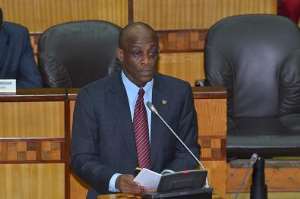
By Belinda Ayamgha, GNA
Accra, July 26, GNA - Mr Seth Terkper, Minister of Finance says Ghana has for the first time financed it budget deficit with credits or overdrafts from the Bank of Ghana (BoG).
It has financed the 2.5 per cent deficit with domestic and foreign financing.
Speaking during his presentation of the Mid-Year Review of the Budget and economic policy, he noted that provisional data from January to May, showed a fiscal deficit of 2.5 per cent of the Gross Domestic Product (GDP), compared to a budget deficit of 2.2 per cent in the same period in 2015.
He said in line with the BoG zero-financing, domestic financing of the deficit, including non-resident participation in local bonds amounted to GH₵ 0.3 billion, while foreign financing resulted in net payment of GH₵ 128.9 million.
'It is important to note that this is the first time in our country's history that financing of the budget deficit, approved by this august House, is not benefiting from any credits or overdrafts from the Bank of Ghana to date,' he stated.
Mr. Terkper said Ghana's ability to cope without BoG financing coincided with a major policy shift in fiscal management: the exploration of alternative sources of mobilising funds, including the first-time use of the Ghana Stock Exchange to sell, refinance and buy government's three-year and five - year bonds, which is gradually replacing the traditional use of BoG auctions.
He noted that the pace of accumulating public debt had started to slow down, with provisional data to end-May showing that Public Debt had decreased from about 72 per cent of GDP at the end of 2015 to about 63 per cent at the end of May.
'The total comprises 26 per cent domestic debt and 37 per cent foreign—a mix that also shows the need for judicious balance between these two sources of raising funds for development,' he said.
He noted that the feat had been achieved against the background of enormous economic pressures, which resulted in the growth of GDP (the denominator in the ratio) actually dipping for four successive years.
'Despite these improving and, in many cases, impressive performances, we are not about to be complacent.
'The public debt- to-GDP ratio will continue to vary, in line with factors such as new loans, disbursements, value of the Cedi, and growth of Output or GDP.
'However, our focus is clear: to make our debt ratio sustainable and consistent with our B ratings in capital markets. We will continue with our "smart" borrowing programs, in particular, to increase infrastructure development,' he said.
He noted that government had adopted new debt management strategies including escrow and self-financing programmes- in particular, making our commercially viable projects pay for loans and putting them on public debt, restraint on annual borrowing through prudent quotas, amortization to minimise the "bullet" loans in our debt stock.
He said government had pursued more active domestic and external capital market engagements and improving the "buy back" policy launched for marketable public debt instruments—to redeem debts over the term of some loans, when they trade favourably on the capital markets.
'In the medium term, the plans of government remains focused on managing the public debt at the lowest cost and at prudent levels of risk.'
GNA




 TUC tells informal sector employers to pay their employees the minimum wage
TUC tells informal sector employers to pay their employees the minimum wage
 Prof. Marfo urges good civilian-security relations to promote peace
Prof. Marfo urges good civilian-security relations to promote peace
 I was nearly jailed because of NPP; I’m still ‘pained’ — Hopeson Adorye
I was nearly jailed because of NPP; I’m still ‘pained’ — Hopeson Adorye
 Rising against NPP after being a minister for 15 years is a sin; God will judge ...
Rising against NPP after being a minister for 15 years is a sin; God will judge ...
 Cecilia Dapaah: Reasons behind AG’s advice to EOCO not grounded in law – Martin ...
Cecilia Dapaah: Reasons behind AG’s advice to EOCO not grounded in law – Martin ...
 NPP should have reported Kingsley Nyarko’s conduct to police – Inusah Fuseini
NPP should have reported Kingsley Nyarko’s conduct to police – Inusah Fuseini
 Akufo-Addo cuts sod for MIIF Technical Training Centre
Akufo-Addo cuts sod for MIIF Technical Training Centre
 NPP didn’t struggle to win Ejisu by-election – Samuel Ayeh-Paye
NPP didn’t struggle to win Ejisu by-election – Samuel Ayeh-Paye
 A/R: Achiase Chief arrested for acid attack on community members
A/R: Achiase Chief arrested for acid attack on community members
 Naa Ayemoede returns to school
Naa Ayemoede returns to school
